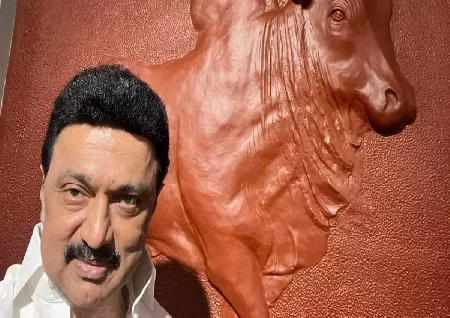CM Stalin inaugurates museum displaying artefacts excavated from Keeladi site

On Sunday, M K Stalin, the chief minister of Tamil Nadu, opened the Keeladi Heritage Museum in Sivaganga, near to the famed archaeological site that was found in 2014. According to a government statement, the museum was built for 18.42 crore rupees on 31,000 square feet of ground. The official announcement further stated that the structure, which was constructed in the traditional Chettinad style, exhibits artefacts and antiques that have been recovered from the site in the current Sivaganga district since 2017 by the Tamil Nadu State Department of Archaeology. As the artefacts' carbon dating indicates that they date to 600 BCE and were discovered to be contemporaneous with the Gangetic Age, the excavations at Keeladi have moved the Sangam Era back three centuries from its original position. North Indian plains civilization, it said. Tamil Nadu forwarded these excavations to the Beta Analytical laboratory in the USA for analysis as confirmation. The village of Keeladi is situated in the former Madurai district beside the Vaigai river. The finds, which point to urban civilisation on the banks of the Vaigai River, were retrieved, according to the announcement. "The discoveries demonstrate that there was a civilisation along the Vaigai river as early as the sixth century. We know that the Tamil population who lived on the banks of the Vaigai river increased their economy through agriculture, pottery, and weaving thanks to the currently known finds and data, according to the statement. "Stones from Gujarat and Maharashtra have been utilised to create jewels like sapphire beads, which demonstrate the area's trading connections. The existence of commerce with the Gangetic Plain is confirmed by the presence of silver coins from the fifth century AD, it was added. The museum's antiquities are shown in distinct buildings based on six themes, including agriculture and water management, apparel and accessories, marine trade, and living, with the intention of showcasing the history, legacy, and culture of Tamils. The state wishes for the significance of the findings achieved via this museum to be understood by the people of Tamil Nadu and the rest of the world.
Related queries to this article
- CM Stalin
- Chief minister of Tamil Nadu
- Keeladi Heritage Museum
- Sivaganga
- Tamil Nadu State Department of Archaeology
Read more articles and stories on InstaSity Trending Topics.



